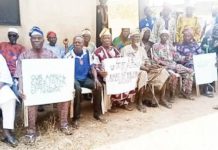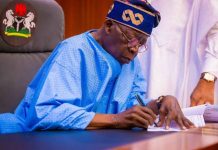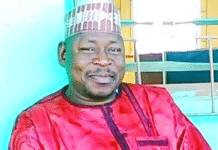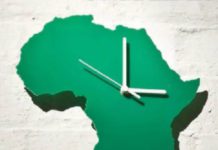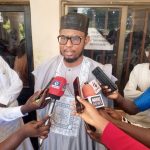Nigeria, World Teachers’ Day, Nonviolence, Et Cetera
By Ebuka Ukoh
Honoured in Word and Deed
“Nigeria’s teachers carry the future on their shoulders, but the nation is crushing their spirit. It is time to replace empty words with fair pay, and speeches with real investment.”
Every October 5, the world pauses to honour teachers—the unsung architects of our tomorrow. This day is deeply personal. I remember Mr Ezekiel Adesina, who taught me from Primary I through IV. Under flickering lights, he paced our classroom, insisting: “Make your handwriting legible—you write your future.” He did not just teach letters; he fostered discipline, persistence, and belief in possibilities.
On this World Teachers’ Day, I celebrate Mr Adesina and thousands like him across Nigeria. Yet, celebration without action is hollow. Our teachers deserve more than flowers—they deserve justice, investment, and respect.
Nation Betraying Its Teachers
Nigeria bears a tragic contradiction: We have the world’s highest number of out-of-school children—20 million, according to UNICEF—yet our teachers, the backbone of education, are consistently underfunded.
In Abuja alone, primary school teachers have been on strike for months, demanding the implementation of the ₦70,000 minimum wage and payment of outstanding salaries. Over 400 public schools remain closed, leaving children at home. Local governments have repeatedly failed to keep promises.
Meanwhile, across the country, teachers in rural areas still instruct under leaking roofs, without textbooks or stable pay. Lecturers wait years for back pay. Headteachers run classes under trees when buildings collapse. These are not abstract issues; they are the lived realities of those carrying Nigeria’s future.
Teachers as Nation-Builders
Neglecting teachers means betraying the future. Nobel laureate Ngũgĩ wa Thiong’o of Kenya said that “language is the carrier of culture.” So is education. Our nation’s intellectual and moral architecture depends on teachers.
Writers like Buchi Emecheta of Nigeria and scholars like Pius Adesanmi have long argued that education is not just a pathway—it is the foundation. Teachers are not cogs in the machine; they are the system itself. Yet, in Nigeria, they are treated as afterthoughts.
Retiring Excuses, Raising Education
At 65, Nigeria cannot afford excuses. We should not invest billions in political travel, jetty inaugurations, and vanity projects while classrooms crumble and teachers go unpaid. We cannot demand high exam scores when we neglect those who teach.
Instead, we must demand:
1. Timely and full payment of salaries, including arrears and adjustments for inflation.
2. Significant budget allocation for infrastructure—safe classrooms, laboratories, textbooks, and power.
3. Professional development and protections for teachers—paid training, incentives, and safe working environments.
4. Legislative commitments that link political budgets directly to education funding transparently.
If we continue to starve classrooms, the nation continues to starve.
More Than a Day, a Revolution
World Teachers’ Day should not be just a fleeting celebration—it should be a reset. A mirror held up to Nigeria: Will we keep honouring those shaping our destiny only with words, or will we support them with resources? Mr Adesina taught me that handwriting matters. Today, I say: Let Nigeria make its priorities clear. Fund teachers. Honour their profession. Invest in classrooms where our future resides.
When teachers rise, nations rise. And if October 5 means anything, it means this: The country’s true wealth stands in front of a classroom now, waiting to be honoured—not just in speech, but in action.
Light Among Shadows
Yet even in that hardship, Nigeria’s teachers refuse to be invisible. In 2025, teacher Seyi Anifowose—through the Let There Be Teachers Conference and the nonprofit One Million Teachers—set a Guinness World Record for the largest gathering of teachers in the world. That feat is more than symbolic. It is a declaration: Teachers will be seen, they will gather, they will insist on dignity.
In that moment, a crowd of educators became a statement of strength, unity, and vision. And that record is not a distraction—it is a clarion call for Nigeria to match that audacity with substantive change.
October 2 – International Day of Non-Violence: Peace vs Mob Rule
The day after Nigeria’s national day, October 2, is observed globally as the International Day of Non-Violence, inspired by the civil disobedience activism of Mahatma Gandhi of India. For Nigerians, this year’s reflection could not be more urgent.
In May 2022, Deborah Samuel, 22, a student in Sokoto, was dragged out of class and lynched by her peers. Her crime? A WhatsApp voice note allegedly blasphemed Islam. Two years later, Ammaye, a food vendor in Niger State, met a similar fate—lynched by a mob after a heated exchange with a muslim youth. These killings are not isolated. They expose how fragile our commitment to life, justice, and non-violence has become.
If the International Day of Non-Violence calls the world to reflection, Nigeria must treat it as a national call to action. We are drowning in cycles of violence—lynchings, extrajudicial killings, bandit attacks, and state crackdowns—that weaken our democracy, fill our communities with fear, and make our future uncertain.
Like Nigeria, Like Nepal
Nigeria is not alone in this tragic trajectory. Across the world, peaceful youth-led protests—from Lekki, Lagos, to Kathmandu, Nepal—have been met with swift state violence and suppression. In 2020, youths led the peaceful #EndSARS protests against police brutality, only for that peace to be mired in bloodshed at the Lekki Tollgate. Government forces opened fire on unarmed citizens.
Just weeks ago in Nepal, Gen Z-led demonstrations against corruption began as peaceful assemblies, only to spiral into violence following police crackdowns, infiltration, and hijacking by noxious and sinister groups.
The lesson is sobering: When governments suppress peaceful dissent, they foster the conditions for violence. And when mobs replace courts, the rule of law collapses.
Cost of Silence
The police always vow to make arrests. The government always promises justice. Yet, prosecutions rarely follow. Deborah’s killers posed for selfies with her burning body, but they remain free. Eunice’s killers were never brought to justice. Will Ammaye’s case be any different?
The message to Nigerians is chilling: If a mob kills you, your death may trend for a day, but justice will never follow. And when life can be taken without consequence, law itself becomes optional. This impunity breeds a darker culture, as seen in Lekki. In Katsina, villagers recently welcomed gunmen, praising them as “saviours” and even posing for pictures. Why? They no longer trust the state to protect them. When citizens cheer terrorists, it signifies a loss of faith in the government altogether.
National Call
Non-violence is not a weakness. It is the only foundation where democracy, justice, and dignity can flourish. If people do not demand dignity, no leader will grant it on a platter. This issue transcends religion. Both Christians and Muslims suffer mob violence. Both communities bury their sons and daughters. Both live under the shadow of fear.
The sanctity of life is non-negotiable. Both the Bible and the Quran affirm that judgment belongs to God, not mobs. When clerics preach silence, they are not neutral; they are complicit. Religious leaders must declare unequivocally: “No life should be taken without due process.”
Government institutions must stop promising and start prosecuting. Legislation must criminalise mob participation with severe penalties. Security agencies must be retrained and equipped to prevent lynchings, not merely document them. Civic campaigns must remind citizens that justice delayed is dangerous, but justice denied is deadly. And ordinary Nigerians must resist complicity. To join, cheer, or film a mob killing is to betray our humanity.
Beyond October 2
The International Day of Non-Violence is not just a date on the UN calendar; it is a mirror. It prompts us: Will we continue to let mobs replace courts, bullets replace dialogue, and silence replace justice? Or will we rise to demand Nigeria where life is sacred, justice swift, and peace our primary instinct, not our last resort?
From Lekki to Sokoto, from Niger State to Abuja, the message remains the same: Violence has failed us. Cynicism has numbed us. But non-violence—rooted in courage, community, and conviction—can still redeem us. At 65, Nigeria must abandon excuses and choose peace—not because it is easy, but because the alternative is national suicide. October 2 should not merely be a day of speeches; it must inaugurate a culture where every citizen, every religious leader, and every institution chooses peace over bloodshed, the law over mob, and justice over impunity. If we fail to opt for non-violence today, we may soon find ourselves with no nation left to save.
October 10 – World Mental Health Day:
Silence on Mental Health Must End
On World Mental Health Day, the numbers reveal a story we can no longer ignore. According to the World Health Organisation, Nigeria’s suicide rate is 6.9 per 100,000 people—one of the highest in Africa. In Lagos, a recent survey found that over six per cent of respondents reported suicidal thoughts in the past month, while depression among Nigerian adolescents is estimated at 12.5 per cent. These figures are alarming. Yet, I believe the reality is even worse. Why? Nigeria lacks reliable national data. So, research is chronically underfunded, and stigma keeps many silent. What we measure is only the tip of the iceberg.
Weight of Silence
Mental illness in Nigeria is not uncommon—it is widespread. Depression, anxiety, substance use disorders, and trauma affect millions. But silence remains our loudest response. For too long, we have told people to “pray it away,” “man up,” or “snap out of it.” Meanwhile, the statistics increase, and families bury loved ones whose pain was invisible. “Globally, WHO has long aimed for one psychiatrist per 10,000 people. In many wealthy countries, this ratio is achieved or surpassed. In Nigeria [with over 200 million people], we have fewer than 300 psychiatrists. That means our actual ratio is vastly worse, not to mention the urban–rural divide.”
Systemic Neglect
Nigeria allocates less than five per cent of its health budget to mental health, with most of that going to a handful of underfunded psychiatric hospitals in some major cities. Many states have no practising psychiatrist. Rural communities—where over half the population lives—are abandoned. Schools rarely teach coping skills. Workplaces lack mental health support. Insurance seldom covers therapy. If our official figures show nearly seven suicides per 100,000 Nigerians, imagine the real number, given the stigma and under-reporting, and the poorly equipped coroners’ offices.
Unspoken Areas
This crisis has many layers. Men, for example, are often discouraged from showing vulnerability. Many suppress stress until it explodes in violence, substance abuse, or suicide. In prisons and re-entry communities, untreated trauma fuels cycles of crime. Women suffer intimate partner violence that leaves deep psychological scars but little support. Youth, under unemployment and social pressures, turn to unhealthy coping mechanisms. These hidden aspects of Nigeria’s mental health crisis are invisible in data but not in reality.
Community Response
If the state fails, communities must step in. Churches, mosques, and schools should be safe spaces where people can talk openly about depression and stress without fear. Peer support groups, school clubs, and workplace initiatives can make seeking help less intimidating. At the very least, if help is unavailable, we must not shame those who speak out.
What Must Change
We need reforms on two fronts:
• Policy reform: Mental health must be integrated into primary healthcare. Insurance schemes should cover counselling and therapy. Government budgets must prioritise mental health equally with infectious diseases. Funding for research must increase to understand the true scope of the crisis.
• Cultural reform: We must normalise discussions about pain. Teach boys that seeking help is strength, not weakness. Build classrooms that include emotional intelligence alongside academics.
A Hopeful Vision
This writer envisions a Nigeria where a teenager in Kano can walk into a clinic and find affordable therapy, where a pastor in Ibadan preaches that faith and counselling can work together, and where schools in Enugu teach emotional intelligence, not just exams. Where men can say, “I am struggling,” and be respected.
If we stay silent, the statistics will only worsen. But through policy, community, and compassion, Nigeria can lead Africa in breaking stigma and creating systems that uphold human dignity.
At the core, mental health is not a luxury. It underpins every personal and national aspiration. If we want Nigeria to thrive, we must first build a Nigeria where the mind is cared for.
Mr Ukoh, an alumnus of the American University of Nigeria, Yola, and PhD student at Columbia University, writes from New York.





